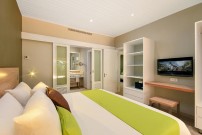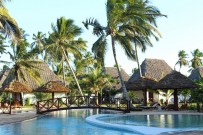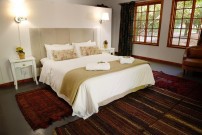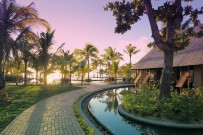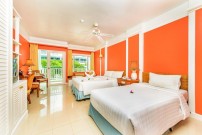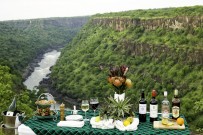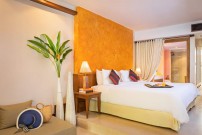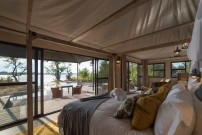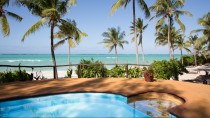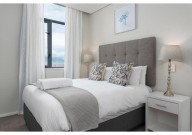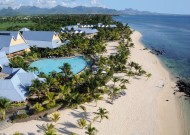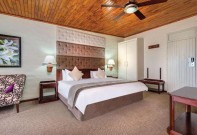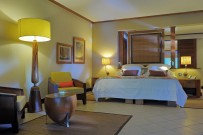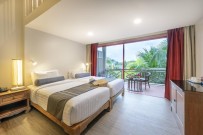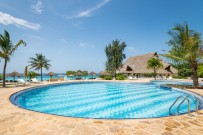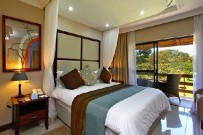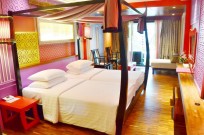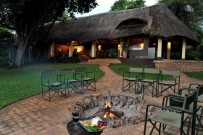Search results for 'Vic Falls'
-
Home away from Home
Mauricia Beachcomber Resort &a...
ZAR6,100.00
ZAR5,990.00
Mauricia Beachcomber Resort & Spa is known for its excellent location. The smart-casual character of Mauricia blends high quality accommodation with superb service. Inspired by contemporary design trends, this hotel attracts vibrant guests whose priorities for their island getaway include – in addition to the highest quality accommodation in this price bracket − sport, entertainment, health and fitness. Mauricia Beachcomber exudes a lively atmosphere, spacious public areas that optimise the dreamy beach views and modern touches that add impeccable attention detail.
The resort is within walking distance of the lively village of Grand Bay one of Mauritius' main tourist hubs, providing guests with a choice of restaurants, bars, discotheques and boutiques during their holiday in Mauritius.
Learn MoreHome away from Home
Blue Bay Beach Resort & Sp...
ZAR2,800.00
ZAR2,485.00
WELCOME TO ZANZIBAR
Jambo! This is the Swahili greeting that you will hear on arrival when you are welcomed by the warm and inviting locals. Zanzibar is the name of an archipelago in the Indian Ocean just off the coast of East Africa. There are many small islands and two large ones: Unguja (the main island, sometimes informally referred to as 'Zanzibar'), and Pemba Island. As the number one beach location in East Africa, Zanzibar is a wonderful island, with classic tropical beaches, lush plantations, an incredible history and a fascinating culture. Apart from historic Stone Town, with its labyrinth of narrow streets, Zanzibar is known for its beautiful palm-fringed beaches and pristine coral reefs.
HISTORY
Zanzibar was inhabited by Portuguese navigators at the end of the 15th century. They were ousted 200 years later by the Omani Arabs and Zanzibar became a major centre for slave trading. The island became an Arab state and was an important centre of trade and politics in the region. European explorers, including Stanley and Livingstone, began their expeditions into the interior of Africa from Zanzibar in the late 1800’s. In 1964, the sultan and the government were overthrown in a revolution and in the same year, Zanzibar and Tanganyika combined to form the United Republic of Tanzania.
LANGUAGE
The indigenous language spoken throughout Zanzibar is Swahili (called Kiswahili locally). English is widely spoken and understood. Jambo Rafiki – Hello my friend!
CULTURE
Most of the people in Zanzibar are Muslim and all towns and villages on Zanzibar Island have mosques. Visitors to Zanzibar Town (Stone Town) will hear the evocative sound of the muezzins calling people to prayer from the minarets, especially for the evening session at sunset. There are also small populations of Christians and Hindus.
CLIMATE
Zanzibar is a few degrees south of the equator and enjoys a very tropical climate. The average daytime high is between 28°C and 32°C and the night-time lows are between 20°C and 25°C. Temperature wise – this island is an all-year-round winner. February is very hot and very humid (just leave your hair straightener at home!) and March to May are the wettest months.
CURRENCY
The local currency is Tanzania Shillings (TSH) but the currency cannot be bought outside of the country. Cash (US Dollars) and credit cards are accepted at hotels and at any Bureau de Change. We strongly recommend that you take USD cash in small denominations for incidental purchases, tips etc.
ELECTRICITY
220/230 V. square pin adapter (same plugs as UK). It is advisable to take along an international adaptor.
MALARIA
As Zanzibar is situated in a malaria zone, it is recommended that you consult your physician on the correct preventative medication required before you travel.
WHAT TO DO IN ZANZIBAR
Whether you spend your days lazing by the pool, sipping cocktails on the beach at sunset, diving in warm waters or enjoying a Dhow cruise around small islands, your Zanzibar holiday will be a memorable experience.
- Diving: With living reefs surrounding the islands, Zanzibar has excellent dive locations. There are plenty of places where the water temperature is warm, visibility is usually excellent, and currents are weak, all of which contributes to an ideal location for first time and novice divers. In addition to the warm and still waters full of colourful fish, there are many challenging dives as well. If you want to surf the current through a ravine, go for deep water, or search for wrecks, there are dive companies that can make it happen for you. Many of the larger resorts on the north and east coasts have professionally-run dive shops as well. Qualified divers must produce certification and a log book.
- Shopping: Whether you’re in the market for T-shirts, spices, kangas, furniture or hand sewn pillow covers, Stone Town is a great place for fun shopping and bargain hunting. You will find the inevitable ashtray carved out of a coconut shell, but there are enough Tinga-tinga paintings, woodcarvings and woven goods to keep almost everyone in the market for a tasteful souvenir.
- Stone Town: Declared a UNESCO World Heritage Site in 2001, Stone Town is a mishmash of cultures, languages and architecture. Over the centuries, Stone Town has grown from a small fishing village to a thriving town with an extraordinary history. Walking around Stone Town, you can see the influence of the different cultures that make up Zanzibar. Coral and stone houses show offimposing Zanzibar doors with brass studs as a defence against charging elephants and carvings with scriptures from the Quran. A tour of the town is highly recommended.
- Excursions: There are loads of excursions available to help you explore this unique island. It is wise to stick to a reputable operator and not be lured by beach boys and vendors who prey on tourists promising cheap prices. There are two excursions that are not to be missed in our opinion. A visit to a spice farm village on the Spice Tour will allow you to walk through the farm with your guide – touching, smelling and tasting different spices and fruits. It will give you an insight into local life and the opportunity to try some Swahili dishes, taste the fruits in season and try some spiced tea.
Setting sail on a traditional dhow will be one of the highlights of your trip. Safari Blue is a full day excursion which takes you out into Menai Bay – a haven of beautiful uninhabited islands where the waters are frequented by humpback and bottlenose dolphins. The anchor is dropped on a sandbank which makes for some spectacular snorkelling. Drinks are served throughout the day and lunch is a buffet of grilled fish, lobster, calamari and chicken. Make sure this one is on your itinerary.
WHAT TO PACK
- As a guide, the maximum weight for checked luggage is 20kg in economy class.
- Your hand-luggage should not weigh more than 6kg and needs to be small and compact
- Take along your best beach and casual wear, perfect for the day
- The dress-code for dinner is usually smart casual and gents may be required to wear long trousers
- Take an umbrella or rain poncho if travelling from October to January to March to June
- When in town, men & women should have their shoulders and knees covered. Bermuda shorts and a polo shirt are perfectly fine but halter-tops and miniskirts are insulting to locals
- Sunglasses and suntan lotion are a must
- Don’t forget any medication that you might need, and be sure to pack it in your hand luggage
- Chargers for all your devices (it’s a good idea to take along a few movies on a tablet or something similar as the English TV channels in your hotel may be limited)
- Swimming shoes and goggles
- Mosquito repellent
- A sun hat or cap
TRAVEL TIPS
- Pack a change of clothing in your hand luggage in case of baggage delays (and a spare cozzie so at least you can have a swim when you get to your resort)
- Clothing creases less if rolled in a sausage shape when packed – so roll, don’t fold
- No sharp objects are permitted in your hand luggage (yes, tweezers are sharp!)
- Travel insurance is a must. If you can’t afford it, you can’t afford to travel!
- Travelling with kids – please check that you have all the relevant documents including unabridged Birth Certificates.
- Put electronics, medication, toothbrushes and jewellery in your carry-on bag
- It’s often a good idea to let your bank or credit card company know that you’re going overseas
- Be patient, be flexible, be spontaneous and have the best time ever!
DID YOU KNOW:
- Due to its proximity to the Equator, Zanzibar is warm throughout the year and has equal days and nights (12-hours each)
- The shortest war ever recorded by man is the Anglo-Zanzibar War where the British bombarded the Beit al Hukum Palace and after 38 minutes, a ceasefire was called.
- Zanzibar is popularly known as the Spice Islands.
- Zanzibar has the largest number of carved doors in Africa
- Freddie Mercury, lead singer of the band Queen, was born in Zanzibar in 1946. His birth name was actually Farouk Bulsara.
Learn MoreHome away from Home
Almar View Guest House
ZAR1,290.00
ZAR1,150.00
Almar View Guest House is located in Alkmaar. Free WiFi access is available in the public areas.
Each room here will provide you with a TV, air conditioning and a private patio. Certain rooms are fitted with a well-equipped kitchenette, while other other rooms feature a microwave, tea-and-coffee-making facilities and basic tableware. All rooms have an en-suite bathroom fitted with a shower, while others also have a bath.
Learn MoreHome away from Home
Trou aux Biches Beachcomber Go...
ZAR10,600.00
ZAR8,900.00
Trou aux Biches Beachcomber Golf Resort & Spa, the most romantic resort in Mauritius. Located on one of the finest resort sites on the island, the resort unfolds its magnificent suites and villas along a long stretch of beach and reaches back another 300 metres into lush, tropical greenery. In keeping with global principles of environmental preservation, Beachcomber ensured that the ancient trees dotted around the area were preserved.
Known for its year-round fabulous weather, the location of Trou aux Biches makes it a highly coveted Mauritian resort. Natural colours and fabrics have been specially selected in the decor to preserve that authentic island style - a trademark of this resort. A staggering 100 swimming pools, some of them private, make this hotel the first choice for the well-travelled, with world-class service, spectacular sunsets and a relaxed atmosphere to complete the experience.
Learn MoreHome away from home
Andaman Seaview Hotel - Karon ...
ZAR4,300.00
ZAR3,797.00
Tastefully designed with some enchanting Sino-Portuguese influence, The Andaman Seaview Hotel is located across the road from the beach and only 5 minutes walk from the restaurants and shops of Karon Beach.
Learn MoreHome away from Home
The Elephant Camp Victoria Fal...
ZAR2,500.00
ZAR2,400.00
WELCOME TO VICTORIA FALLS
Locally known as ‘Mosi-oa-Tunya’, translating to the ‘The Smoke That Thunders’, Victoria Falls are deservedly one of the Seven Natural Wonders of the World. Forming a natural border between Zambia and Zimbabwe, fed by the mighty Zambezi River, the Falls are a sight to behold!
The 100m vertical chasm spanning the full one and a half kilometre width of the river, creates the biggest curtain of falling water in the world and one of the most extraordinary displays of nature’s might and magnificence. Despite the beauty of the Falls themselves, this region warrants the reputation as an adventure centre, offering a plethora of adrenaline-inducing activities both in and around the Falls. The best time for viewing the Falls is from July to October when the water levels are high but the mist has subsided, offering clearer views.
LANGUAGE
The indigenous languages are Ndebele and Shona but English is the official language and is widely spoken and understood.
CULTURE
One arrival in Victoria Falls you will be greeted by some of the friendliest people in the world. The predominant religion is Christianity, with traditional beliefs in rural areas, and some Hindu, Muslim and Jewish minorities.
CLIMATE
Victoria Falls is situated in a summer rainfall region. Instead of differentiating the climate according to the conventional spring/summer/autumn/winter divide, locals consider there to be two distinct climates - the dry season and the wet season. The dry season begins in May and extends through autumn and winter into October. The early part of the dry season is a temperate time with daytime temperatures in the early 20°C range and the mercury often falling to single digit figures at night.
Generally, the rains begin during the course of November and, by December, the wet season has usually set in with hot daytime temperatures, lightened by torrential downpours that generally take place during the late afternoon. At night, temperatures are an average 18°C and, during the day, the temperature can rise into the 30’s. Visiting the Victoria Falls during the wet and dry seasons is a markedly different experience. In early summer, the water level in the Zambezi is at its lowest, and the spray from the Falls is least dense, allowing for more visibility and better photographic conditions. Low water levels mean that parts of the Falls dry up, particularly on the Zambian side, but this is when Devil’s Pool is accessible. During late summer, when the Zambezi is pumping, the spray from the Falls is intense and any visitor to the rainforest can expect to be soaked.
Best time to visit Victoria Falls
May to November are the best months for most visitors but…
- If you want to see the Victoria Falls in full power, go between March and May.
- If your main reason to visit is for the white water-rafting, go between August and early January when the rapids are at their best.
- If a safari is your priority, go between May and October when the vegetation is low and animals are more easily spotted.
CURRENCY
The Zimbabwean dollar is no longer a valid currency and almost all transactions are conducted in US Dollars. The currencies presently used in Zimbabwe include US Dollars and South African Rand. Make sure you have a sufficient amount of foreign currency in your possession, prior to entering the country due to a cash shortage and the fact that many ATMs will not accept international cards. Do not change foreign exchange with moneychangers on the street, as this is illegal. It is best to travel with small denominations of foreign currency.
ELECTRICITY
240 V. square pin adapter (same plugs as UK).
MALARIA
As Victoria Falls is situated in a malaria zone, it is recommended that you consult your physician on the correct preventative medication required before you travel.
TIPPING
Bring small denominations for tipping purposes as small change is very rarely available locally. Whilst not compulsory, it is enormously appreciated and often contributes a substantial amount toward ensuring that those working in the service industry earn a living wage. Just make sure that a service charge hasn’t already been added to your bill.
WHAT TO DO IN VIC FALLS
Victoria Falls will not disappoint; whether you’re seeing the Falls for the first time or planning a hair-raising bungee jump, there is so much to do and see! Your visit will be jam packed with adventure so plan wisely. These are our top recommendations:
- See the Smoke that Thunders
- Take a Sunset River Cruise
- Go white-water rafting
- Enjoy the Flying Fox cable slide
- Do a bungee jump (111 metres – eek!)
- See Vic Falls from a helicopter – the famous "Flight of Angels”
- Be daring with a gorge swing
WHAT TO PACK
- As a guide, the maximum weight for checked luggage is 20kg in economy class and 30kg in business class
- Your hand-luggage should not weigh more than 6kg and needs to be small and compact
- Casual, comfortable clothing is suitable throughout the year
- Jeans or trousers for evenings and cooler days is recommended * In more upmarket hotels and restaurants, elegant casual outfits are recommended for dinner
- Sunglasses, suntan lotion and insect repellent are a must
- Please note that camouflage clothing is banned in Zimbabwe
- Throw in a few warmer items between April and August, especially for early mornings and late evenings
- Don’t forget any medication that you might need, and be sure to pack it in your hand luggage
- Chargers for all your devices (it’s a good idea to take along a few movies on a tablet or something similar as the English TV channels in your hotel may be limited)
- A hat or cap
- Some sturdy walking shoes
- And don’t forget your binoculars
TRAVEL TIPS
- Pack a change of clothing in your hand luggage in case of baggage delays
- Clothing creases less if rolled in a sausage shape when packed – so roll, don’t fold
- No sharp objects are permitted in your hand luggage (yes, tweezers are sharp!)
- Travel insurance is a must. If you can’t afford it, you can’t afford to travel!
- Travelling with kids – please check that you have all the relevant documents including unabridged Birth Certificates.
- Put electronics, medication, toothbrushes and jewellery in your carry-on bag.
- It’s often a good idea to let your bank or credit card company know that you’re going overseas
- Be patient, be flexible, be spontaneous and have the best time ever!
Home away from home
Burasari Phuket Resort & S...
ZAR5,100.00
ZAR5,221.00
Named after the rare Burasari flower that grows on the property, Burasari is a Phuket resort that is an unexpected treasure in the heart of exciting Patong. Burasari is a boutique hotel in Phuket unlike any other Patong Beach hotel, offering a full experience of sophisticated style, comfort, privacy, tranquility, and a first class international dining for discerning travellers. Burasari's Feel at Home philosophy gives our guests the experience of a warm home that embraces you with stylish design, great food, caring service and the calming elements of nature.
Learn MoreHome away from Home
Old Drift Lodge Victoria Falls...
ZAR2,800.00
ZAR2,514.00
WELCOME TO VICTORIA FALLS
Locally known as ‘Mosi-oa-Tunya’, translating to the ‘The Smoke That Thunders’, Victoria Falls are deservedly one of the Seven Natural Wonders of the World. Forming a natural border between Zambia and Zimbabwe, fed by the mighty Zambezi River, the Falls are a sight to behold!
The 100m vertical chasm spanning the full one and a half kilometre width of the river, creates the biggest curtain of falling water in the world and one of the most extraordinary displays of nature’s might and magnificence. Despite the beauty of the Falls themselves, this region warrants the reputation as an adventure centre, offering a plethora of adrenaline-inducing activities both in and around the Falls. The best time for viewing the Falls is from July to October when the water levels are high but the mist has subsided, offering clearer views.
LANGUAGE
The indigenous languages are Ndebele and Shona but English is the official language and is widely spoken and understood.
CULTURE
One arrival in Victoria Falls you will be greeted by some of the friendliest people in the world. The predominant religion is Christianity, with traditional beliefs in rural areas, and some Hindu, Muslim and Jewish minorities.
CLIMATE
Victoria Falls is situated in a summer rainfall region. Instead of differentiating the climate according to the conventional spring/summer/autumn/winter divide, locals consider there to be two distinct climates - the dry season and the wet season. The dry season begins in May and extends through autumn and winter into October. The early part of the dry season is a temperate time with daytime temperatures in the early 20°C range and the mercury often falling to single digit figures at night.
Generally, the rains begin during the course of November and, by December, the wet season has usually set in with hot daytime temperatures, lightened by torrential downpours that generally take place during the late afternoon. At night, temperatures are an average 18°C and, during the day, the temperature can rise into the 30’s. Visiting the Victoria Falls during the wet and dry seasons is a markedly different experience. In early summer, the water level in the Zambezi is at its lowest, and the spray from the Falls is least dense, allowing for more visibility and better photographic conditions. Low water levels mean that parts of the Falls dry up, particularly on the Zambian side, but this is when Devil’s Pool is accessible. During late summer, when the Zambezi is pumping, the spray from the Falls is intense and any visitor to the rainforest can expect to be soaked.
Best time to visit Victoria Falls
May to November are the best months for most visitors but…
- If you want to see the Victoria Falls in full power, go between March and May.
- If your main reason to visit is for the white water-rafting, go between August and early January when the rapids are at their best.
- If a safari is your priority, go between May and October when the vegetation is low and animals are more easily spotted.
CURRENCY
The Zimbabwean dollar is no longer a valid currency and almost all transactions are conducted in US Dollars. The currencies presently used in Zimbabwe include US Dollars and South African Rand. Make sure you have a sufficient amount of foreign currency in your possession, prior to entering the country due to a cash shortage and the fact that many ATMs will not accept international cards. Do not change foreign exchange with moneychangers on the street, as this is illegal. It is best to travel with small denominations of foreign currency.
ELECTRICITY
240 V. square pin adapter (same plugs as UK).
MALARIA
As Victoria Falls is situated in a malaria zone, it is recommended that you consult your physician on the correct preventative medication required before you travel.
TIPPING
Bring small denominations for tipping purposes as small change is very rarely available locally. Whilst not compulsory, it is enormously appreciated and often contributes a substantial amount toward ensuring that those working in the service industry earn a living wage. Just make sure that a service charge hasn’t already been added to your bill.
WHAT TO DO IN VIC FALLS
Victoria Falls will not disappoint; whether you’re seeing the Falls for the first time or planning a hair-raising bungee jump, there is so much to do and see! Your visit will be jam packed with adventure so plan wisely. These are our top recommendations:
- See the Smoke that Thunders
- Take a Sunset River Cruise
- Go white-water rafting
- Enjoy the Flying Fox cable slide
- Do a bungee jump (111 metres – eek!)
- See Vic Falls from a helicopter – the famous "Flight of Angels”
- Be daring with a gorge swing
WHAT TO PACK
- As a guide, the maximum weight for checked luggage is 20kg in economy class and 30kg in business class
- Your hand-luggage should not weigh more than 6kg and needs to be small and compact
- Casual, comfortable clothing is suitable throughout the year
- Jeans or trousers for evenings and cooler days is recommended * In more upmarket hotels and restaurants, elegant casual outfits are recommended for dinner
- Sunglasses, suntan lotion and insect repellent are a must
- Please note that camouflage clothing is banned in Zimbabwe
- Throw in a few warmer items between April and August, especially for early mornings and late evenings
- Don’t forget any medication that you might need, and be sure to pack it in your hand luggage
- Chargers for all your devices (it’s a good idea to take along a few movies on a tablet or something similar as the English TV channels in your hotel may be limited)
- A hat or cap
- Some sturdy walking shoes
- And don’t forget your binoculars
TRAVEL TIPS
- Pack a change of clothing in your hand luggage in case of baggage delays
- Clothing creases less if rolled in a sausage shape when packed – so roll, don’t fold
- No sharp objects are permitted in your hand luggage (yes, tweezers are sharp!)
- Travel insurance is a must. If you can’t afford it, you can’t afford to travel!
- Travelling with kids – please check that you have all the relevant documents including unabridged Birth Certificates.
- Put electronics, medication, toothbrushes and jewellery in your carry-on bag.
- It’s often a good idea to let your bank or credit card company know that you’re going overseas
- Be patient, be flexible, be spontaneous and have the best time ever!
Home away from Home
Hilton Garden Inn Umhlanga Arc...
ZAR2,620.00
ZAR1,997.00
A continental breakfast is available daily at Hilton Garden Inn Umhlanga Arch.
Popular points of interest near the hotel include Umhlanga rocks Beach, Umhlanga Main Beach and Bronze Beach. The nearest airport is King Shaka International, 13 km from Hilton Garden Inn Umhlanga Arch, and the property offers a paid airport shuttle service.
Learn MoreHome away from home
Manathai Khao Lak- Thailand
ZAR4,500.00
ZAR4,092.00
The Old Phuket offers Sino-Portuguese style architecture and an atmosphere that will take guests back to the days of the spice trade and the golden age of travel before resorts and package tours. The golden sands of Karon Beach stretch out in front of the hotel, and the hustle and bustle of Patong Beach is a short drive away.
Learn MoreHome away from Home
Kichanga Lodge Zanzibar - 7 Ni...
ZAR2,200.00
ZAR1,935.00
WELCOME TO ZANZIBAR
Jambo! This is the Swahili greeting that you will hear on arrival when you are welcomed by the warm and inviting locals. Zanzibar is the name of an archipelago in the Indian Ocean just off the coast of East Africa. There are many small islands and two large ones: Unguja (the main island, sometimes informally referred to as 'Zanzibar'), and Pemba Island. As the number one beach location in East Africa, Zanzibar is a wonderful island, with classic tropical beaches, lush plantations, an incredible history and a fascinating culture. Apart from historic Stone Town, with its labyrinth of narrow streets, Zanzibar is known for its beautiful palm-fringed beaches and pristine coral reefs.
HISTORY
Zanzibar was inhabited by Portuguese navigators at the end of the 15th century. They were ousted 200 years later by the Omani Arabs and Zanzibar became a major centre for slave trading. The island became an Arab state and was an important centre of trade and politics in the region. European explorers, including Stanley and Livingstone, began their expeditions into the interior of Africa from Zanzibar in the late 1800’s. In 1964, the sultan and the government were overthrown in a revolution and in the same year, Zanzibar and Tanganyika combined to form the United Republic of Tanzania.
LANGUAGE
The indigenous language spoken throughout Zanzibar is Swahili (called Kiswahili locally). English is widely spoken and understood. Jambo Rafiki – Hello my friend!
CULTURE
Most of the people in Zanzibar are Muslim and all towns and villages on Zanzibar Island have mosques. Visitors to Zanzibar Town (Stone Town) will hear the evocative sound of the muezzins calling people to prayer from the minarets, especially for the evening session at sunset. There are also small populations of Christians and Hindus.
CLIMATE
Zanzibar is a few degrees south of the equator and enjoys a very tropical climate. The average daytime high is between 28°C and 32°C and the night-time lows are between 20°C and 25°C. Temperature wise – this island is an all-year-round winner. February is very hot and very humid (just leave your hair straightener at home!) and March to May are the wettest months.
CURRENCY
The local currency is Tanzania Shillings (TSH) but the currency cannot be bought outside of the country. Cash (US Dollars) and credit cards are accepted at hotels and at any Bureau de Change. We strongly recommend that you take USD cash in small denominations for incidental purchases, tips etc.
ELECTRICITY
220/230 V. square pin adapter (same plugs as UK). It is advisable to take along an international adaptor.
MALARIA
As Zanzibar is situated in a malaria zone, it is recommended that you consult your physician on the correct preventative medication required before you travel.
WHAT TO DO IN ZANZIBAR
Whether you spend your days lazing by the pool, sipping cocktails on the beach at sunset, diving in warm waters or enjoying a Dhow cruise around small islands, your Zanzibar holiday will be a memorable experience.
- Diving: With living reefs surrounding the islands, Zanzibar has excellent dive locations. There are plenty of places where the water temperature is warm, visibility is usually excellent, and currents are weak, all of which contributes to an ideal location for first time and novice divers. In addition to the warm and still waters full of colourful fish, there are many challenging dives as well. If you want to surf the current through a ravine, go for deep water, or search for wrecks, there are dive companies that can make it happen for you. Many of the larger resorts on the north and east coasts have professionally-run dive shops as well. Qualified divers must produce certification and a log book.
- Shopping: Whether you’re in the market for T-shirts, spices, kangas, furniture or hand sewn pillow covers, Stone Town is a great place for fun shopping and bargain hunting. You will find the inevitable ashtray carved out of a coconut shell, but there are enough Tinga-tinga paintings, woodcarvings and woven goods to keep almost everyone in the market for a tasteful souvenir.
- Stone Town: Declared a UNESCO World Heritage Site in 2001, Stone Town is a mishmash of cultures, languages and architecture. Over the centuries, Stone Town has grown from a small fishing village to a thriving town with an extraordinary history. Walking around Stone Town, you can see the influence of the different cultures that make up Zanzibar. Coral and stone houses show offimposing Zanzibar doors with brass studs as a defence against charging elephants and carvings with scriptures from the Quran. A tour of the town is highly recommended.
- Excursions: There are loads of excursions available to help you explore this unique island. It is wise to stick to a reputable operator and not be lured by beach boys and vendors who prey on tourists promising cheap prices. There are two excursions that are not to be missed in our opinion. A visit to a spice farm village on the Spice Tour will allow you to walk through the farm with your guide – touching, smelling and tasting different spices and fruits. It will give you an insight into local life and the opportunity to try some Swahili dishes, taste the fruits in season and try some spiced tea.
Setting sail on a traditional dhow will be one of the highlights of your trip. Safari Blue is a full day excursion which takes you out into Menai Bay – a haven of beautiful uninhabited islands where the waters are frequented by humpback and bottlenose dolphins. The anchor is dropped on a sandbank which makes for some spectacular snorkelling. Drinks are served throughout the day and lunch is a buffet of grilled fish, lobster, calamari and chicken. Make sure this one is on your itinerary.
WHAT TO PACK
- As a guide, the maximum weight for checked luggage is 20kg in economy class.
- Your hand-luggage should not weigh more than 6kg and needs to be small and compact
- Take along your best beach and casual wear, perfect for the day
- The dress-code for dinner is usually smart casual and gents may be required to wear long trousers
- Take an umbrella or rain poncho if travelling from October to January to March to June
- When in town, men & women should have their shoulders and knees covered. Bermuda shorts and a polo shirt are perfectly fine but halter-tops and miniskirts are insulting to locals
- Sunglasses and suntan lotion are a must
- Don’t forget any medication that you might need, and be sure to pack it in your hand luggage
- Chargers for all your devices (it’s a good idea to take along a few movies on a tablet or something similar as the English TV channels in your hotel may be limited)
- Swimming shoes and goggles
- Mosquito repellent
- A sun hat or cap
TRAVEL TIPS
- Pack a change of clothing in your hand luggage in case of baggage delays (and a spare cozzie so at least you can have a swim when you get to your resort)
- Clothing creases less if rolled in a sausage shape when packed – so roll, don’t fold
- No sharp objects are permitted in your hand luggage (yes, tweezers are sharp!)
- Travel insurance is a must. If you can’t afford it, you can’t afford to travel!
- Travelling with kids – please check that you have all the relevant documents including unabridged Birth Certificates.
- Put electronics, medication, toothbrushes and jewellery in your carry-on bag
- It’s often a good idea to let your bank or credit card company know that you’re going overseas
- Be patient, be flexible, be spontaneous and have the best time ever!
DID YOU KNOW:
- Due to its proximity to the Equator, Zanzibar is warm throughout the year and has equal days and nights (12-hours each)
- The shortest war ever recorded by man is the Anglo-Zanzibar War where the British bombarded the Beit al Hukum Palace and after 38 minutes, a ceasefire was called.
- Zanzibar is popularly known as the Spice Islands.
- Zanzibar has the largest number of carved doors in Africa
- Freddie Mercury, lead singer of the band Queen, was born in Zanzibar in 1946. His birth name was actually Farouk Bulsara.
Home away from Home
Axis Luxury Apartments
ZAR2,655.00
ZAR2,422.00
Located in Cape Town in the Western Cape region, with Milnerton Beach and Lagoon Beach nearby, Axis Luxury Apartments provides accommodation with free WiFi and free private parking.
Featuring a kitchen with a microwave and a fridge, each unit also comes with a safety deposit box, a satellite flat-screen TV, ironing facilities, wardrobe and a seating area with a sofa. There is a private bathroom with shower and a hairdryer in each unit, along with free toiletries.
Learn MoreHome away from Home
Victoria Beachcomber Resort &...
ZAR7,500.00
ZAR6,986.00
Breathtakingly beautiful public areas are one of the exceptional features that define this resort. Another is the fresh feel, clean lines and modern design of the lobby, lounge, bar and restaurant areas. There’s no way of guessing the kinds of visitors who specifically prefer Victoria, because it quickly becomes the number one resort for every kind of guest, be it they families, honeymooners or conference-goers.
The rooms are among the largest and most stylish in the 4-star category on the island, making them ideal for family holidays as most rooms can accommodate two adults and two children. Family apartments are also available with a separate room for children. Aside from the chic design of the lobby, you can stand in the entrance of the resort and gaze out over the pool and across to the sea as it stretches into a golden horizon. Sunsets are spectacular in Mauritius. At Victoria, they're mesmerising. This resort has particularly excellent facilities for the groups and incentive market, with three restaurants that ensure culinary variety with every dining experience.
Learn MoreHome awaya from Home
Protea Hotel by Marriott Hazyv...
ZAR1,800.00
ZAR1,593.00
Protea Hotel by Marriott Hazyview has an outdoor pool overlooking the surrounding mountains, just 20 minutes' drive from the Kruger National Park. Set on a lush 10 acre garden estate, it features deluxe rooms. All rooms boast a country-style décor which includes plush armchairs and ornate furniture. Most rooms have scenic garden views and are fitted with air conditioning, satellite TV and a tea / coffee maker. Learn MoreHome away from Home
Paradis Beachcomber Golf Resor...
ZAR12,500.00
ZAR11,692.00
Paradis Beachcomber Golf Resort & Spa is one of the most prestigious resorts in Mauritius. Located on a stunning peninsula, Paradis is renowned worldwide for its high profile facilities and services and first-class accommodation.
Le Morne peninsula's shoreline stretches for seven kilometres and features one of the best beaches on the island. A unique wow factor includes 13 recently renovated luxury villas built along a private beach where guests have the option of an 'own home' seaside holiday. Island-style, rustic thatch accents the public areas, which are extremely close to the beach, and add authenticity to the tropical atmosphere.
The resort has four fine restaurants and shares a further four with its neighbour, Dinarobin. Recognised internationally by those in the know as a premier golf resort, its picturesque 18-hole course has attracted players of varying skills and guests from all over the globe since we opened its doors.
Learn MoreHome away from home
Krabi Thai Village Resort - Th...
ZAR4,500.00
ZAR4,200.00
Krabi Thai Village Resort aims to make your holiday in Krabi a special and memorable affair, never to be forgotten. Luxury accommodation in delightful two and three story Thai-inspired buildings combines the best in traditional style with modern comforts and amenities which are always at hand to fulfil every whim, every desire.
Learn MoreHome Away From Home
Sandies Baobab - 7 Nights
ZAR2,900.00
ZAR2,758.00
WELCOME TO ZANZIBAR
Jambo! This is the Swahili greeting that you will hear on arrival when you are welcomed by the warm and inviting locals. Zanzibar is the name of an archipelago in the Indian Ocean just off the coast of East Africa. There are many small islands and two large ones: Unguja (the main island, sometimes informally referred to as 'Zanzibar'), and Pemba Island. As the number one beach location in East Africa, Zanzibar is a wonderful island, with classic tropical beaches, lush plantations, an incredible history and a fascinating culture. Apart from historic Stone Town, with its labyrinth of narrow streets, Zanzibar is known for its beautiful palm-fringed beaches and pristine coral reefs.
HISTORY
Zanzibar was inhabited by Portuguese navigators at the end of the 15th century. They were ousted 200 years later by the Omani Arabs and Zanzibar became a major centre for slave trading. The island became an Arab state and was an important centre of trade and politics in the region. European explorers, including Stanley and Livingstone, began their expeditions into the interior of Africa from Zanzibar in the late 1800’s. In 1964, the sultan and the government were overthrown in a revolution and in the same year, Zanzibar and Tanganyika combined to form the United Republic of Tanzania.
LANGUAGE
The indigenous language spoken throughout Zanzibar is Swahili (called Kiswahili locally). English is widely spoken and understood. Jambo Rafiki – Hello my friend!
CULTURE
Most of the people in Zanzibar are Muslim and all towns and villages on Zanzibar Island have mosques. Visitors to Zanzibar Town (Stone Town) will hear the evocative sound of the muezzins calling people to prayer from the minarets, especially for the evening session at sunset. There are also small populations of Christians and Hindus.
CLIMATE
Zanzibar is a few degrees south of the equator and enjoys a very tropical climate. The average daytime high is between 28°C and 32°C and the night-time lows are between 20°C and 25°C. Temperature wise – this island is an all-year-round winner. February is very hot and very humid (just leave your hair straightener at home!) and March to May are the wettest months.
CURRENCY
The local currency is Tanzania Shillings (TSH) but the currency cannot be bought outside of the country. Cash (US Dollars) and credit cards are accepted at hotels and at any Bureau de Change. We strongly recommend that you take USD cash in small denominations for incidental purchases, tips etc.
ELECTRICITY
220/230 V. square pin adapter (same plugs as UK). It is advisable to take along an international adaptor.
MALARIA
As Zanzibar is situated in a malaria zone, it is recommended that you consult your physician on the correct preventative medication required before you travel.
WHAT TO DO IN ZANZIBAR
Whether you spend your days lazing by the pool, sipping cocktails on the beach at sunset, diving in warm waters or enjoying a Dhow cruise around small islands, your Zanzibar holiday will be a memorable experience.
- Diving: With living reefs surrounding the islands, Zanzibar has excellent dive locations. There are plenty of places where the water temperature is warm, visibility is usually excellent, and currents are weak, all of which contributes to an ideal location for first time and novice divers. In addition to the warm and still waters full of colourful fish, there are many challenging dives as well. If you want to surf the current through a ravine, go for deep water, or search for wrecks, there are dive companies that can make it happen for you. Many of the larger resorts on the north and east coasts have professionally-run dive shops as well. Qualified divers must produce certification and a log book.
- Shopping: Whether you’re in the market for T-shirts, spices, kangas, furniture or hand sewn pillow covers, Stone Town is a great place for fun shopping and bargain hunting. You will find the inevitable ashtray carved out of a coconut shell, but there are enough Tinga-tinga paintings, woodcarvings and woven goods to keep almost everyone in the market for a tasteful souvenir.
- Stone Town: Declared a UNESCO World Heritage Site in 2001, Stone Town is a mishmash of cultures, languages and architecture. Over the centuries, Stone Town has grown from a small fishing village to a thriving town with an extraordinary history. Walking around Stone Town, you can see the influence of the different cultures that make up Zanzibar. Coral and stone houses show offimposing Zanzibar doors with brass studs as a defence against charging elephants and carvings with scriptures from the Quran. A tour of the town is highly recommended.
- Excursions: There are loads of excursions available to help you explore this unique island. It is wise to stick to a reputable operator and not be lured by beach boys and vendors who prey on tourists promising cheap prices. There are two excursions that are not to be missed in our opinion. A visit to a spice farm village on the Spice Tour will allow you to walk through the farm with your guide – touching, smelling and tasting different spices and fruits. It will give you an insight into local life and the opportunity to try some Swahili dishes, taste the fruits in season and try some spiced tea.
Setting sail on a traditional dhow will be one of the highlights of your trip. Safari Blue is a full day excursion which takes you out into Menai Bay – a haven of beautiful uninhabited islands where the waters are frequented by humpback and bottlenose dolphins. The anchor is dropped on a sandbank which makes for some spectacular snorkelling. Drinks are served throughout the day and lunch is a buffet of grilled fish, lobster, calamari and chicken. Make sure this one is on your itinerary.
WHAT TO PACK
- As a guide, the maximum weight for checked luggage is 20kg in economy class.
- Your hand-luggage should not weigh more than 6kg and needs to be small and compact
- Take along your best beach and casual wear, perfect for the day
- The dress-code for dinner is usually smart casual and gents may be required to wear long trousers
- Take an umbrella or rain poncho if travelling from October to January to March to June
- When in town, men & women should have their shoulders and knees covered. Bermuda shorts and a polo shirt are perfectly fine but halter-tops and miniskirts are insulting to locals
- Sunglasses and suntan lotion are a must
- Don’t forget any medication that you might need, and be sure to pack it in your hand luggage
- Chargers for all your devices (it’s a good idea to take along a few movies on a tablet or something similar as the English TV channels in your hotel may be limited)
- Swimming shoes and goggles
- Mosquito repellent
- A sun hat or cap
TRAVEL TIPS
- Pack a change of clothing in your hand luggage in case of baggage delays (and a spare cozzie so at least you can have a swim when you get to your resort)
- Clothing creases less if rolled in a sausage shape when packed – so roll, don’t fold
- No sharp objects are permitted in your hand luggage (yes, tweezers are sharp!)
- Travel insurance is a must. If you can’t afford it, you can’t afford to travel!
- Travelling with kids – please check that you have all the relevant documents including unabridged Birth Certificates.
- Put electronics, medication, toothbrushes and jewellery in your carry-on bag
- It’s often a good idea to let your bank or credit card company know that you’re going overseas
- Be patient, be flexible, be spontaneous and have the best time ever!
DID YOU KNOW:
- Due to its proximity to the Equator, Zanzibar is warm throughout the year and has equal days and nights (12-hours each)
- The shortest war ever recorded by man is the Anglo-Zanzibar War where the British bombarded the Beit al Hukum Palace and after 38 minutes, a ceasefire was called.
- Zanzibar is popularly known as the Spice Islands.
- Zanzibar has the largest number of carved doors in Africa
- Freddie Mercury, lead singer of the band Queen, was born in Zanzibar in 1946. His birth name was actually Farouk Bulsara.
Home away from Home
A’Zambezi River Lodge
ZAR2,900.00
ZAR2,750.00
The A’Zambezi River Lodge is the only hotel with a river frontage and jetty site in Victoria Falls. A’Zambezi River Lodge is located in Victoria Falls, Zimbabwe 25km from the airport, nestling on the banks of the mighty Zambezi with the Zambezi National Park located close by.
Learn MoreHome away from home
Patong Beach Hotel- Thailand
ZAR4,300.00
ZAR4,180.00
The Patong Beach Hotel has steadily built a strong reputation for hospitality, service and efficiency - all with that unique Thai flavour! This great value resort is situated in the heart of Patong, close to recreational activities and only 3 minutes walk from the beachfront.
Learn MoreHome away from Home
Imbabala Zambezi Safari Lodge ...
ZAR2,500.00
ZAR2,028.00
WELCOME TO VICTORIA FALLS
Locally known as ‘Mosi-oa-Tunya’, translating to the ‘The Smoke That Thunders’, Victoria Falls are deservedly one of the Seven Natural Wonders of the World. Forming a natural border between Zambia and Zimbabwe, fed by the mighty Zambezi River, the Falls are a sight to behold!
The 100m vertical chasm spanning the full one and a half kilometre width of the river, creates the biggest curtain of falling water in the world and one of the most extraordinary displays of nature’s might and magnificence. Despite the beauty of the Falls themselves, this region warrants the reputation as an adventure centre, offering a plethora of adrenaline-inducing activities both in and around the Falls. The best time for viewing the Falls is from July to October when the water levels are high but the mist has subsided, offering clearer views.
LANGUAGE
The indigenous languages are Ndebele and Shona but English is the official language and is widely spoken and understood.
CULTURE
One arrival in Victoria Falls you will be greeted by some of the friendliest people in the world. The predominant religion is Christianity, with traditional beliefs in rural areas, and some Hindu, Muslim and Jewish minorities.
CLIMATE
Victoria Falls is situated in a summer rainfall region. Instead of differentiating the climate according to the conventional spring/summer/autumn/winter divide, locals consider there to be two distinct climates - the dry season and the wet season. The dry season begins in May and extends through autumn and winter into October. The early part of the dry season is a temperate time with daytime temperatures in the early 20°C range and the mercury often falling to single digit figures at night.
Generally, the rains begin during the course of November and, by December, the wet season has usually set in with hot daytime temperatures, lightened by torrential downpours that generally take place during the late afternoon. At night, temperatures are an average 18°C and, during the day, the temperature can rise into the 30’s. Visiting the Victoria Falls during the wet and dry seasons is a markedly different experience. In early summer, the water level in the Zambezi is at its lowest, and the spray from the Falls is least dense, allowing for more visibility and better photographic conditions. Low water levels mean that parts of the Falls dry up, particularly on the Zambian side, but this is when Devil’s Pool is accessible. During late summer, when the Zambezi is pumping, the spray from the Falls is intense and any visitor to the rainforest can expect to be soaked.
Best time to visit Victoria Falls
May to November are the best months for most visitors but…
- If you want to see the Victoria Falls in full power, go between March and May.
- If your main reason to visit is for the white water-rafting, go between August and early January when the rapids are at their best.
- If a safari is your priority, go between May and October when the vegetation is low and animals are more easily spotted.
CURRENCY
The Zimbabwean dollar is no longer a valid currency and almost all transactions are conducted in US Dollars. The currencies presently used in Zimbabwe include US Dollars and South African Rand. Make sure you have a sufficient amount of foreign currency in your possession, prior to entering the country due to a cash shortage and the fact that many ATMs will not accept international cards. Do not change foreign exchange with moneychangers on the street, as this is illegal. It is best to travel with small denominations of foreign currency.
ELECTRICITY
240 V. square pin adapter (same plugs as UK).
MALARIA
As Victoria Falls is situated in a malaria zone, it is recommended that you consult your physician on the correct preventative medication required before you travel.
TIPPING
Bring small denominations for tipping purposes as small change is very rarely available locally. Whilst not compulsory, it is enormously appreciated and often contributes a substantial amount toward ensuring that those working in the service industry earn a living wage. Just make sure that a service charge hasn’t already been added to your bill.
WHAT TO DO IN VIC FALLS
Victoria Falls will not disappoint; whether you’re seeing the Falls for the first time or planning a hair-raising bungee jump, there is so much to do and see! Your visit will be jam packed with adventure so plan wisely. These are our top recommendations:
- See the Smoke that Thunders
- Take a Sunset River Cruise
- Go white-water rafting
- Enjoy the Flying Fox cable slide
- Do a bungee jump (111 metres – eek!)
- See Vic Falls from a helicopter – the famous "Flight of Angels”
- Be daring with a gorge swing
WHAT TO PACK
- As a guide, the maximum weight for checked luggage is 20kg in economy class and 30kg in business class
- Your hand-luggage should not weigh more than 6kg and needs to be small and compact
- Casual, comfortable clothing is suitable throughout the year
- Jeans or trousers for evenings and cooler days is recommended * In more upmarket hotels and restaurants, elegant casual outfits are recommended for dinner
- Sunglasses, suntan lotion and insect repellent are a must
- Please note that camouflage clothing is banned in Zimbabwe
- Throw in a few warmer items between April and August, especially for early mornings and late evenings
- Don’t forget any medication that you might need, and be sure to pack it in your hand luggage
- Chargers for all your devices (it’s a good idea to take along a few movies on a tablet or something similar as the English TV channels in your hotel may be limited)
- A hat or cap
- Some sturdy walking shoes
- And don’t forget your binoculars
TRAVEL TIPS
- Pack a change of clothing in your hand luggage in case of baggage delays
- Clothing creases less if rolled in a sausage shape when packed – so roll, don’t fold
- No sharp objects are permitted in your hand luggage (yes, tweezers are sharp!)
- Travel insurance is a must. If you can’t afford it, you can’t afford to travel!
- Travelling with kids – please check that you have all the relevant documents including unabridged Birth Certificates.
- Put electronics, medication, toothbrushes and jewellery in your carry-on bag.
- It’s often a good idea to let your bank or credit card company know that you’re going overseas
- Be patient, be flexible, be spontaneous and have the best time ever!



